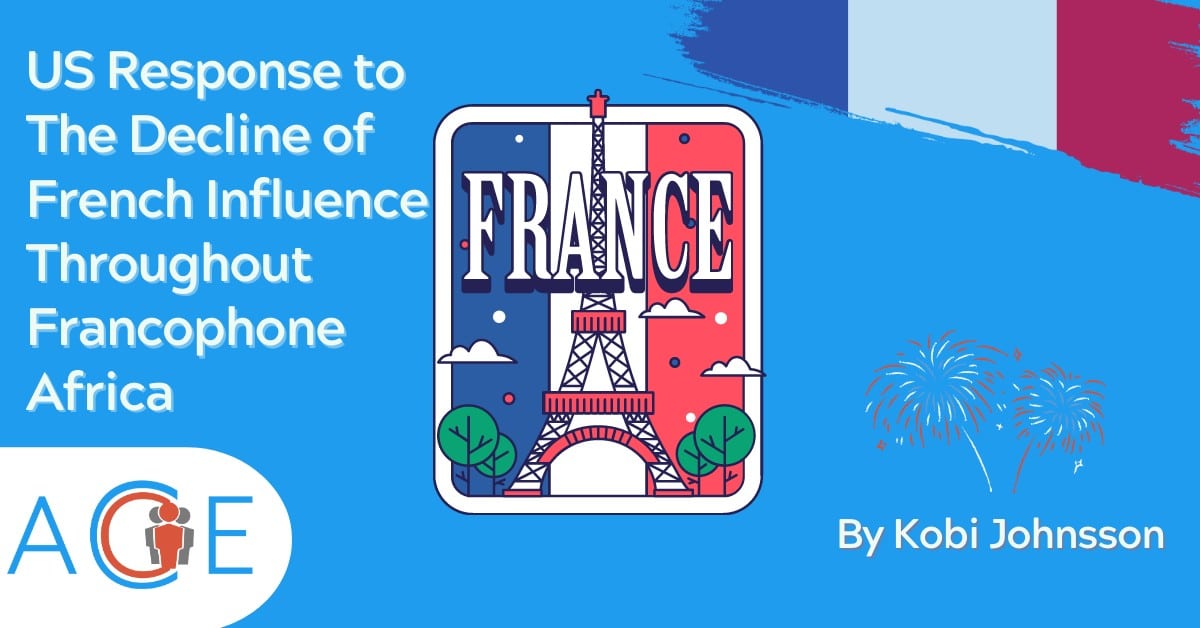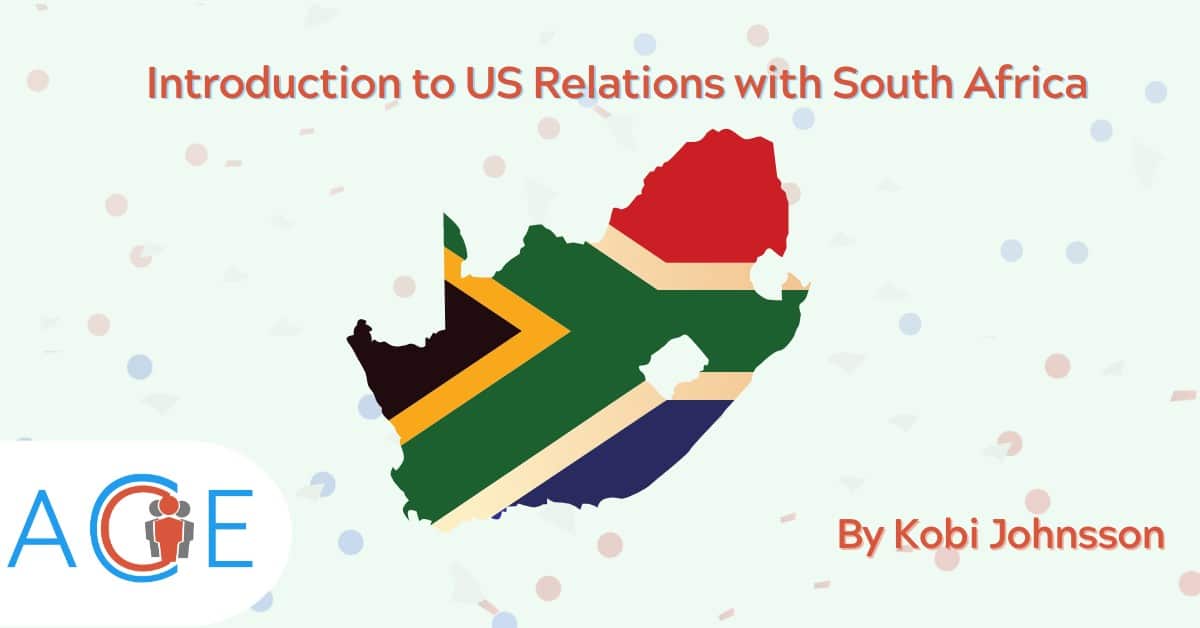Introduction
Since its decolonization, France has held outsized influence in French-speaking (Francophone) African countries, cemented by its policy of Françafrique, which was designed to keep Francophone countries firmly within France’s sphere of influence. Through this policy, France was able to continue to protect and promote French interests in Francophone Africa.
However, this sphere of influence has been waning, with France slowly losing its economic influence in the region, and struggling to provide the regional security benefits it once did. Recently, France removed all their soldiers from Mali and Burkina Faso, and was unable to prevent a coup in Niger, despite having troops stationed. With France now seeking a reset of relations within the region as a whole, it provides both opportunity and danger to US interests in Francophone countries, and Sub-Saharan Africa as a whole.
Background Information
After World War II, France, along with other European empires, began facing increasing pressure to grant independence to their colonies. France, however, did not want to lose the benefits it gained from its African colonies. As France granted its colonies independence, it also worked to set up a pré carré (translated as one’s little corner) system in their former African colonies that would keep the newly independent nations firmly within France’s influence. This was done by setting up Francophone Africa’s economy in a way that tied the countries to France by creating a regional currency and economic bloc, which allowed France to maintain access to essential resources. France also maintained a military presence in the new countries, which allowed France to intervene militarily within the states to protect France’s interests, and made it the de facto stabilizer of the region.
This system began to fall apart in the 1990’s, when the French government supported Juvenal Habyarimana’s Rwandan regime despite concerns of increased ethnic tension, which ended up being the cause of the Rwandan genocide. This severely shook Francophone Africa’s trust in France, as the nations viewed France’s support of Rwanda as protecting French interests at the expense of African lives. This concern surrounding France’s reliability and worth as a partner was further enforced by France’s own shifting view of the partnership, as it sought to scale back its military presence on the continent. This reduced trust in governments that had relied on French help to secure their countries. Economic investment also began to shift away from the previous, French dominated, economic system, lowering confidence in France’s value as an economic ally.
All of these developments have led to a souring of opinion of France in Francophone Africa, and has left the door open for other countries to increase their influence in the region. However, this weakening influence has also decreased the security of the countries, as France struggles to provide regional security as it previously did, and Francophone countries struggle to replace France’s role as a stabilizer in the region. In recent years, France has had to withdraw soldiers from Mali and Burkina Faso, which were stationed in those countries to help fight terrorist groups. France has also watched as regimes supportive of French interests have been overthrown by coups, most recently in Niger.
US Response
The US’s response to France’s diminishing influence has been mixed so far, with the US increasingly expanding its economic ties to Francophone African countries, but working with France often on regional security issues.
On economic issues, the US has been working to increase its economic ties with Sub-Saharan Africa, including Francophone Africa, and have therefore used previously existing acts, such as the African Growth and Opportunity Act, to help boost trade and improve economic ties with Francophone African countries specifically. The US has also increased its push for a free trade zone throughout all of Africa, which would undercut France’s regional economic strength with Francophone countries, while increasing US access to resources and goods found in French-speaking African countries.
When it comes to military and regional security issues, the US has expanded their military footprint in Africa, establishing a military base in Djibouti and creating AFRICOM, the United States Africa Command, which coordinates security efforts and crisis response on the African continent.
However, US and French interests are more aligned when it comes to security, so the two nations have often found themselves advocating for the same outcome, especially with counterterrorism efforts in the Sahel region. This has often led both countries to push for the same outcomes, such as in response to the coup in Niger, although these efforts have had less success.
Potential Benefits
The potential benefits from the US increasing its influence are mostly found in the economic sphere, where it can sell themselves as a strong partner based on a strong record of trading with English-speaking African countries, which are viewed in Africa to generally be a ‘step ahead’ of their Francophone counterparts. The US has also emphasized equal partnerships with African nations, which resonates well with Francophone countries. Increased trade and economic ties with Francophone Africa are beneficial because of the increased access to markets and resources they provide, but also because they provide the US with an ability to demonstrate its value as an economic partner to the developing world, which tends to view US involvement as imperial, rather than as a partnership.
Another benefit for increased US participation in Francophone Africa is counteracting Russia and China’s influence in the region. China, specifically, has used the ‘Belt and Road’ initiative to increase its influence throughout Africa through loans and investments in infrastructure in the developing world. This program now has 44 Sub-Saharan African countries as partners, and China continues to invest heavily in new infrastructure projects in partner countries, along with seeking to increase trade with the continent. By increasing ties to Francophone countries, the US would limit the chance that those countries would end up becoming more hostile to US interests through an increased alignment with China and Russia.
Potential Drawbacks
A major drawback of increasing US influence in Francophone Africa is that security concerns tend to be similar for Western nations. This means weakening France’s sphere of influence further puts US security interests at risk, especially considering the current state of the Sahel region. France is still a strong security partner for Francophone African countries outside of the Sahel, and weakening them further could lead to more instability throughout the entire region, especially considering that the US could struggle to step in as a security partner
Furthermore, this action would create an opportunity for geopolitical competitors like Russia and China to expand their security influence in Africa. These countries are already becoming more engaged in the Sahel region and across Africa. They could highlight their recent successes, like Russia’s Wagner Group aiding in stabilizing countries where France and Western nations faced challenges. This could make them more appealing to Francophone African countries as partners, shifting countries away from Western interests. This would run contrary to US goals in the region, especially considering that the US is more aligned with France in most global interests.


